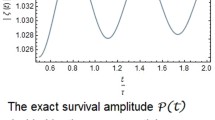Abstract
The initial decay rate of a mixed state is discussed; is shown to be zero for finite energy states. In the previous paper [1] we investigated a general scheme for description of unstable systems. One of our results concerned the initial decay rate. Generalizing the earlier results ofHorwitz andMarchand (see [2] and other references contained in [1]) we proved there, that the initial decay rate of any pure state of the unstable system equals to zero, if this state is so called finite energy state.
Here we shall be interested in the same problem, assuming now the state of the decaying system to be in generalmixed. Such assumption seems to be reasonable: firstly, from the point of view of an experiment it is too restrictive to treat only pure states of unstable systems. In particular, mixed states are generally considered in the recent studies about the influence of measuring devices on the time evolution of the unstable system [3]. Moreover, for this kind of problems the behaviour of the unstable system immediately after its preparation, especially the initial decay rate, is of great importance (see also [4, 5]).
We shall prove in this paper that for finite energy states the initial decay rate is equal to zero, which generalizes the result contained in [1].
Similar content being viewed by others
References
Havlíček M., Exner P., Czech. J. Phys.B 23 (1973), 594.
Horwitz L. P., LaVita J., Marchand J.-P., J. Math. Phys.12 (1971), 2537.
Twareque Ali S., Fonda L., Ghirardi G. C., N. Cim.25 A (1975), 134.
Twareque Ali S., Ghirardi G. C., N. Cim.24 A (1975), 220.
Ekstein H., Siegert A. J. F., Ann. Phys. (NY)68 (1971), 509.
Beskow A., Nilson J., Arkiv för Fysik34 (1967), 561.
Fonda L., Ghirardi G. C., Rimini A., Weber T., N. Cim.15 A (1973), 689.
Exner P.,Havlíček M., Proceedings of 3rd Conference of Czechoslovak Physicists (Olomouc, 1973), 98 (in Czech).
Degasperis A., Fonda L., Ghirardi G. C., N. Cim.21 A (1974), 471.
Akhiezer N. I., Glazman I. M., Linear Operator Theory in Hilbert Space (in Russian), Nauka, Moscow 1966.
Kolmogorov A. N., Fomin S. V., Elements of the Theory of Functions and Functional Analysis (in Russian), Nauka, Moscow 1972.
Blank J., Exner P., Havlíček M., Selected Topics of Mathematical Physics: Linear Operators on Hilbert Space I (in Czech), SPN, Prague 1975.
Jauch J. M., Foundations of Quantum Mechanics, Addison-Wesley Publ. Co, London 1968.
Author information
Authors and Affiliations
Rights and permissions
About this article
Cite this article
Exner, P. Remark on the decay of a mixed state. Czech J Phys 26, 976–982 (1976). https://doi.org/10.1007/BF01587444
Received:
Issue Date:
DOI: https://doi.org/10.1007/BF01587444



